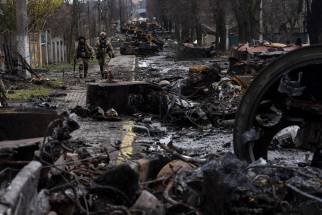Leadership track takes dinosaur’s stance on climate change
Read this article for free:
or
Already have an account? Log in here »
To continue reading, please subscribe:
Monthly Digital Subscription
$19 $0 for the first 4 weeks*
- Enjoy unlimited reading on winnipegfreepress.com
- Read the E-Edition, our digital replica newspaper
- Access News Break, our award-winning app
- Play interactive puzzles
*No charge for 4 weeks then billed as $19 every four weeks (new subscribers and qualified returning subscribers only). Cancel anytime.
Read unlimited articles for free today:
or
Already have an account? Log in here »
Hey there, time traveller!
This article was published 03/04/2022 (900 days ago), so information in it may no longer be current.
Last week, two days before the release of an alarming report from the United Nations Intergovernmental Panel on Climate Change, Pierre Poilievre was in Winnipeg to advance his bid to lead the Conservative Party of Canada, promoting new opportunities to ship oil through the Port of Churchill.
If elected leader, and if he forms government in a future election, Poilievre envisions shipping 100,000 barrels a day of Alberta crude to Churchill using CanaPux, a process that allows bitumen to be converted into pellets and shipped as dry goods. If a pipeline were built to Churchill, another 200,000 barrels per day of oil could be shipped through northern Manitoba.
There’s a lot of inherent flaws to unpack in Poilievre’s announcement, including the fact the Ontario MP doesn’t really understand the politics of Churchill, Canada’s only Arctic port.
For decades, transportation and commodity companies have ignored the geographic logic Churchill represents in favour of shipping through West Coast ports and the St. Lawrence Seaway. That is unlikely to change under a Poilievre government.
However, the more worrisome flaw in Poilievre’s plan is the fact it flies directly in the face of macro political and economic forces at work to lessen the world’s reliance on fossil fuels.

Investing federal tax dollars on schemes to boost the amount of oil exported from Canada is a losing strategy at a time when major automakers have already announced plans to electrify their fleets and most governments around the world are looking for strategies to enhance zero-emission energy production.
Which brings us to the UN climate change report.
The panel warned unless we all drastically reduce greenhouse gas emissions by 2030 — and by drastic, the panel means a 43 per cent cut — we will lose our opportunity to save the planet from wildfires, floods and droughts that accompany steadily climbing temperatures.
Examined against the backdrop of that report, Poilievre’s announcement is not just misguided, it’s dangerous and destructive. But can it be successful in winning the Tory leadership?
Poilievre is already one of Canada’s most notorious climate change deniers. He has made it abundantly clear in the early days of his leadership campaign, if he becomes prime minister, he will cut the carbon tax, dismantle “anti-energy” policies introduced by the Liberals and take steps to bolster the country’s oil and gas industry.
Pierre Poilievre is already one of Canada’s most notorious climate change deniers.
That perspective may not be shared by a majority of Canadians but it is warmly embraced by a significant constituency within the Conservative party. There is reason to believe there is method to the madness of Poilievre’s leadership strategy — particularly if he is able to attract new party members who share his skepticism about climate change.
It should be noted none of the other declared leadership candidates seem particularly strong on climate change policy. Most — including former Ontario Tory leader Patrick Brown, former Quebec premier Jean Charest, Ontario MPP Roman Baber and MP Leslyn Lewis — oppose the Liberal carbon tax without providing much in the way of concrete ideas about how to curb emissions.
That means, even if Poilievre fails, there is every reason to believe the person who does win will fall well-short of emission-reduction targets.
That is not an endorsement of the Liberal party; the self-declared champions of climate change policy have been nothing short of underwhelming since coming to power in 2015.
Prime Minister Justin Trudeau introduced a carbon tax to fund programs to promote clean energy and ween Canadians off fossil fuels. But the Trudeau Liberals have also struggled to use those revenues to produce real progress in reducing emissions.

Canada’s greenhouse gas emissions continue to rise, and the economy continues to be disproportionately reliant on the oil and gas industry..
Recent changes to the Liberal climate change policy do commit the country to a 40 per cent reduction in emissions by 2030, a target very much in keeping with the recommendations of the UN panel. However, to actually achieve those goals — and remember, Canada hasn’t actually hit any previous emission-reduction targets — we’re going to need a level of political commitment that has so far escaped the Liberals.
The world needs governments heeding the warnings and making progress in reducing emissions to show average citizens carbon-neutral economies are within our grasp.
(The same UN report did note the growth in alternative energy sources have exceeded forecasts.So, there has been some progress. Just not enough to save the planet.)
If the climate change believers cannot start showing real progress, Canada and other countries will most definitely end up in the in the hands of deniers like Poilievre.
We don’t have the time left to allow that to happen.
dan.lett@freepress.mb.ca

Dan Lett
Columnist
Born and raised in and around Toronto, Dan Lett came to Winnipeg in 1986, less than a year out of journalism school with a lifelong dream to be a newspaper reporter.
Our newsroom depends on a growing audience of readers to power our journalism. If you are not a paid reader, please consider becoming a subscriber.
Our newsroom depends on its audience of readers to power our journalism. Thank you for your support.











